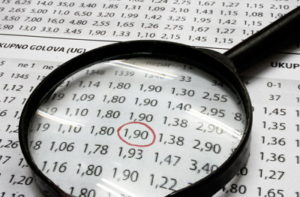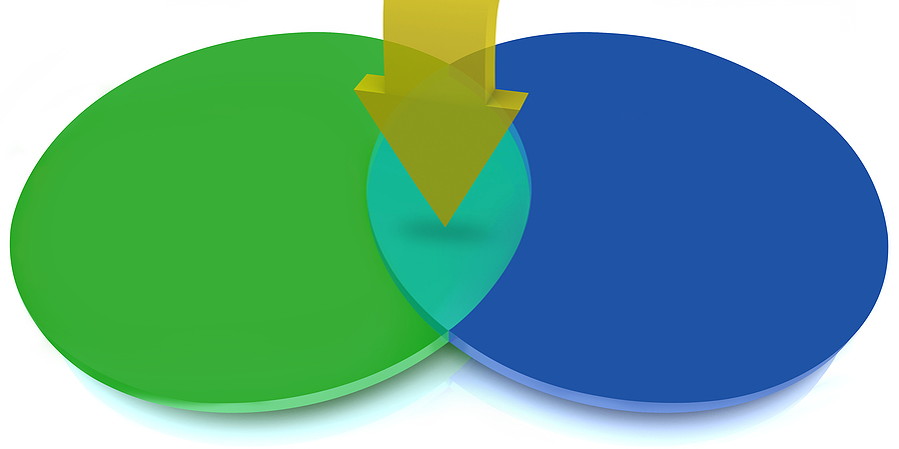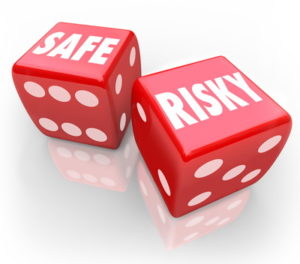 You’ll often hear that bookmakers are seeking to ‘balance the book’, but what does this actually mean? In short it is where a bookmaker will work to ensure that they stand to make a profit irrespective of the outcome of an event. They do this be adjusting the true odds for an event so that they factor in a margin. This margin then guarantees the bookie makes a profit if it can balance the book, i.e. take an equal proportion of bets on all possible outcomes.
You’ll often hear that bookmakers are seeking to ‘balance the book’, but what does this actually mean? In short it is where a bookmaker will work to ensure that they stand to make a profit irrespective of the outcome of an event. They do this be adjusting the true odds for an event so that they factor in a margin. This margin then guarantees the bookie makes a profit if it can balance the book, i.e. take an equal proportion of bets on all possible outcomes.
This means bookmakers provide odds that are lower than what the genuine odds would be. The more bets a bookie takes on an outcome, the lower the odds offered will drop to to help them reduce liabilities on that specific outcome. Conversely the odds on opposite outcomes will increase as the bookie attempts to attract bets in order to balance its book.
In simplistic terms, a bookmaker’s desired outcome is one in which the each outcome has the same liability, i.e. each outcome has the same payout if it wins. One of the ways that they look to ensure this is by lowering the odds on the result that most people are betting on whilst make the odds on other results higher. This will discourage people from betting on one result and encourage them to bet on another. The hope is that they will then be able to pay the winners with money taken from the losers, all whilst taking their own cut of the money.
Bookies use other tricks to balance books too, such as laying off their liabilities to competitors or even wholesale bookmakers (like financial clearing houses but for bet liabilities). Here risk on specific outcomes can be traded to ensure all bookies can balance a book and make a profit.
In reality it is rare that a book is completely balanced and often bookies have to take positions on certain events. In these cases they can stand to lose. For some bets, like the favourite in the Grand National, all bookies may be over-exposed and therefore it is impossible to balance a book. If the favourite does win then in these instances the whole industry stands to lose on that particular bet. Luckily for them the favourite only wins the National 15% of the time so in most years they make a good profit.
What Is A Book?
 The idea of a ‘book’ in betting comes from the origins of bookmaking. Back when betting was in its formative years, bets would be written down into a ledger, or book. The person accepting the bets would keep track of this book so that they knew how much money they would owe certain people when the result of what they were betting on was known. It is easy to understand how they became known as ‘bookmakers’ because they were indeed ‘making’ the book up, filling it with numerous different bets from countless different people.
The idea of a ‘book’ in betting comes from the origins of bookmaking. Back when betting was in its formative years, bets would be written down into a ledger, or book. The person accepting the bets would keep track of this book so that they knew how much money they would owe certain people when the result of what they were betting on was known. It is easy to understand how they became known as ‘bookmakers’ because they were indeed ‘making’ the book up, filling it with numerous different bets from countless different people.
In the modern era, there is no physical book in play for the majority of bookies. Instead, computers track all bets being placed by customers, whether that is in person at a betting shop or via a bookmaker’s website. On-course bookmakers also use computers to keep track of the bets that they’ve accepted, meaning that they can soon be alerted if they are facing a large exposure over one outcome or another. This is why bookies are constantly looking to alter their odds, ensuring that they keep things as even as they possibly can.
Keeping Things Balanced

One of the most common misconceptions about the world of betting is that bookmakers are constantly keeping their books balanced every second of the day. The reality is that this would be virtually impossible, even with the use of computers and the associated algorithms. Instead, bookies work to ensure that their books are balanced over the long-term. It is not impossible for a bookmaker to be facing a liability in one event, for example, but know that they’ve got it covered thanks to the guaranteed profit coming their way courtesy of a different event.
It is easy enough for a bookie to balance the books in events that are likely to be close and where they will almost certainly take a similar amount of money on each outcome. As an example, let’s imagine that we’re looking at the outcome of cup final between Liverpool and Manchester City. The quality of both teams is such that they’re going to be well-balanced, so we know that the bookmakers will take a not dissimilar amount of money on the outcome of the game, with a definitive outcome being necessary because it’s a cup final.
The bookmakers believe that Liverpool are slight favourites, offering odds of 8/15 (1.53) on them winning the cup compared to 11/8 (2.37) for City to do so. Here we can calculate their margin using the following formula:
1/2.37 x 1/1.53 = 107.6%
The bookmaker’s profit margin is everything over 100, or 7.6%. In a world in which £6,535 is bet on Liverpool and £4,219 is bet on Manchester City, the bookmaker in question will make a profit of £755 regardless of the actual outcome of the football match. Bookies add a margin into their pricing for two reasons: firstly to give themselves a profit and secondly to ensure that there is a buffer in the event that they have priced the market up incorrectly.
Eliminating Risk
 Bookmakers make money because, most of the time, they’re able to eliminate any risk. There are numerous ways that they look to do this, with an obvious one coming in the form of putting their own capital into the same bet with other bookmakers. This means that they have covered their own liability and won’t outright lose money in the event that the outcome goes in favour of the thing that they’ve seen a large sum of money bet on. In other words, if someone has bet, say, £10,000 on Liverpool then the bookie will also bet on Liverpool with a different company to cover potential losses.
Bookmakers make money because, most of the time, they’re able to eliminate any risk. There are numerous ways that they look to do this, with an obvious one coming in the form of putting their own capital into the same bet with other bookmakers. This means that they have covered their own liability and won’t outright lose money in the event that the outcome goes in favour of the thing that they’ve seen a large sum of money bet on. In other words, if someone has bet, say, £10,000 on Liverpool then the bookie will also bet on Liverpool with a different company to cover potential losses.
That’s obviously a simplistic explanation of what happens, but it will give you some sense of the sort of thing that happens in order to ensure that bookmakers don’t lose money. Of course, bookies only face large liabilities in certain circumstances. Let’s imagine that Liverpool are playing Tranmere Rovers, with Liverpool’s real odds being 1.11 and Tranmere’s being 10. A bookie makes the odds 1.05 and 8.50 respectively, building in a margin. A £10,000 bet on Liverpool won’t leave them very exposed, but the same amount bet on Tranmere would.
Another way that bookies will balance their books is by wholesale offsetting or by offering promotion odds on the outcome that fewer people are betting on. Whilst Liverpool would be outright favourites to beat Tranmere Rovers, it obviously does sometimes happen that the underdog wins and so there will always be people tempted to met on them. If a bookmaker offers larger odds than you would expect on that outcome, it will tempt some people into placing that bet and allowing the bookie to cover possible losses.
Trading Liabilities
 In the complete opposite mindset to the punter no bookie wants to actually take a risk. They are happier with a steady profit margin rather than risk potential big swings between profit and loss by taking big positions on markets. This is where the phrase ‘you never see a poor bookie’ comes from, the art of bookmaking is to control your liabilities to ensure a profit. This is what has enabled some betting companies to now be worth tens of billions.
In the complete opposite mindset to the punter no bookie wants to actually take a risk. They are happier with a steady profit margin rather than risk potential big swings between profit and loss by taking big positions on markets. This is where the phrase ‘you never see a poor bookie’ comes from, the art of bookmaking is to control your liabilities to ensure a profit. This is what has enabled some betting companies to now be worth tens of billions.
In the modern world liabilities can be traded in betting clearing houses, a kind of wholesale bookmaker that matches up the liability of one bookie with and opposing liability from another to offset the risk of each. Betting companies will not often even know who they have offset a liability with, simply that they are covered in the event of a specific outcome.
It is a lot like exchange betting, where normal people can back and lay (offer bets to others) on markets and also, if they do the maths properly and bet at the right time, can guarantee a profit on an event. Indeed, most so called ‘professional gamblers’ make money by backing and laying on exchanges, waiting to take advantage of favourable odds on opposite outcomes at different times, therefore giving them a profit whatever the outcome.
Betting company liabilities cannot always be traded, as in the earlier Grand National example, but can be wholly or partially offset most of the time. There are rare instances when bookies lose a lot, such as when Leicester won the league at 5000/1, when Donald Trump became president with many backing him in double figure odds, etc., but in general those news stories are rare. Whenever you hear a bookie cry poverty think of the majority of times they never say anything and quietly go on making their profit by balancing books and offsetting liability.
